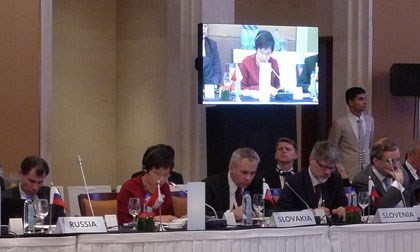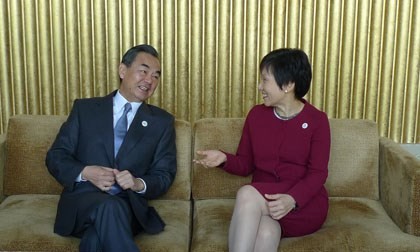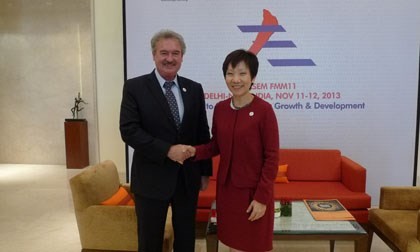 Minister Grace Fu speaking at the ASEM FMM 11 Plenary, 11 November 2013 (Photo: MFA)
Minister Grace Fu speaking at the ASEM FMM 11 Plenary, 11 November 2013 (Photo: MFA)
 Meeting between Minister Grace Fu and Chinese Foreign Minister Wang Yi at the sidelines of the ASEM FMM 11, 11 November 2013 (Photo: MFA)
Meeting between Minister Grace Fu and Chinese Foreign Minister Wang Yi at the sidelines of the ASEM FMM 11, 11 November 2013 (Photo: MFA) Meeting between Minister Grace Fu and Luxembourg DPM and Foreign Minister Jean Asselborn at the sidelines of the ASEM FMM 11, 11 November 2013 (Photo: MFA)
Meeting between Minister Grace Fu and Luxembourg DPM and Foreign Minister Jean Asselborn at the sidelines of the ASEM FMM 11, 11 November 2013 (Photo: MFA)Minister, Prime Minister’s Office, Second Minister for the Environment and Water Resources and Second Minister for Foreign Affairs Ms Grace Fu attended the first two plenary sessions of the 11th ASEM Foreign Ministers Meeting (FMM 11) in Gurgaon, India on 11 November 2013. Minister Fu was the first Lead Speaker for Plenary Session I, titled “Economic Growth and Sustainable Development: Challenges and Opportunities in Asia and Europe”. In her speech, Minister Fu highlighted the importance of a stable global financial system, and Singapore’s interest in contributing to global discussions on international financial reforms. Minister Fu also touched on Asia’s strong growth prospects and welcomed increased cooperation between Asia and Europe in areas such as infrastructure, aviation and logistics.
In Plenary Session II, the Ministers discussed non-traditional security challenges such as cyber and water security. In her intervention, Minister Fu touched on two challenges to sustainable development, namely water management and transboundary haze pollution. She highlighted the importance of sustainable water management to Singapore given our position as a small island-state, and underscored the need to work closely with regional countries to counter transboundary haze. The texts of her speech and intervention are attached.
Minister Fu had six bilateral meetings at the sidelines of the ASEM FMM 11 on 11 November 2013. She met with Chinese Foreign Minister Mr Wang Yi, Czech Foreign Minister Mr Jan Kohout, Luxembourg Deputy Prime Minister and Foreign Minister Mr Jean Asselborn, Portuguese Foreign Minister Mr Rui Machete, Spanish Secretary of State for Foreign Affairs Mr Gonzalo De Benito and Minister of State for the Foreign and Commonwealth Office of the United Kingdom Mr Hugo Swire.
Minister Fu had a good meeting with Chinese Minister for Foreign Affairs Mr Wang Yi. They reaffirmed the warm bilateral relations between Singapore and China, particularly at the leaders’ level. Minister Wang also updated Minister Fu on recent developments in China.
Minister Fu and the Czech Foreign Minister Mr Jan Kohout noted the warm bilateral ties between both countries, and discussed ways to enhance economic collaboration. Mr Kohout expressed support for the EU-Singapore Free Trade Agreement (EUSFTA), and looked forward to its expeditious ratification and entry into force.
Minister Fu and Deputy Prime Minister and Foreign Minister of Luxembourg Mr Jean Asselborn reaffirmed the excellent cooperation between Singapore and Luxembourg at both bilateral and multilateral platforms, such as the Global Governance Group (3G). DPM Asselborn also updated Minister Fu on recent developments in Luxembourg and Europe.
Portuguese Foreign Minister Rui Machete briefed Minister Fu on the investment opportunities in Portugal, particularly in the infrastructure, transportation, aviation and postal services sectors. They looked forward to more high-level exchanges between the two countries.
Spanish Secretary of State for Foreign Affairs Mr Gonzalo de Benito briefed Minister Fu on Spain’s economic recovery, and invited Singapore companies to increase their investments into Spain. The two leaders discussed ways to strengthen bilateral cooperation in various sectors, including aviation and infrastructure development. Mr de Benito also expressed Spain’s strong support for the quick ratification of the EUSFTA, which will bring about significant benefits for Singapore, Spanish and EU companies.
Minister Fu also had a good exchange with Minister of State for the Foreign and Commonwealth Office of the United Kingdom Mr Hugo Swire on developments in the region.
. . . . .
MINISTRY OF FOREIGN AFFAIRS
SINGAPORE
11 NOVEMBER 2013
________________________________________
SPEECH BY MINISTER GRACE FU AT THE ASEM FMM 11 PLENARY SESSION I, 11 NOVEMBER 2013
Minister Khurshid
Foreign Ministers
Colleagues
1 I am delighted to be back in India. India is a very old friend of Singapore and of Southeast Asia – our relationship goes back to historical times when early Indian traders established trade links with the region. Indian hospitality is well known for its warmth and graciousness, and I would like to thank our host for the generous hospitality that has been extended to us. I understand that our SOM leaders have had the privilege of enjoying India’s street food at the dinner hosted by Secretary Kantha on Saturday, and I myself look forward to enjoying Indian cuisine, which I know will be splendid.
2 On a more sombre note, I would also like to say that Singapore is deeply saddened by the destruction caused by Typhoon Haiyan. On behalf of the Government and people of Singapore, I extend our heartfelt condolences to the people and government of the Philippines, particularly to those who have lost loved ones and their homes in the disaster. But I know that the Philippine spirit is strong, and I have full faith that you will be able to courageously overcome the consequences of these acts of nature.
3 Ministers and colleagues, the theme of this session centres on economic growth and sustainable development. My speech will focus on three points today. First, on the state of the global economy. Second, on the outlook for Asia. Third, on the active partnerships to seize opportunities both regions have to offer.
Global Economy – A Fragile Recovery
4 We meet in New Delhi against the backdrop of a recovering global economy. The Eurozone is regaining confidence. It recorded 1.2 percent growth in the second quarter of 2013 after 18 months of contraction. Confidence has been strengthened by the establishment of the European Stability Mechanism and its successful inaugural bond issue in the capital markets in October 2013.
5 Yet, structural problems remain in the global world of finance. The sustainability of governments’ fiscal policies continues to be of concern. These will have to be addressed systematically. The pace of recovery in the US is moderate. There is still no long-standing solution to the debt ceiling. 16 days of government closures this year is estimated to have reduced US GDP by 0.9%. Ongoing fiscal cutbacks continue to dampen growth.
6 The global economic recovery therefore remains fragile. The IMF projects global growth at 2.9 percent in 2013, below the 3.2 percent recorded in 2012. We cannot afford to be complacent. The challenge for us is to generate growth, which requires countries to take concrete steps to transform our economies and societies.
7 The stability of the financial system is important to growth as we have already been set back by several shocks, such as the financial crisis of 2008. Singapore, as a major financial centre and investment hub, has a particular interest in contributing to global discussions on international financial reforms, long-term financing for investment and sustained economic growth, such as at the G20 and IMF. Our involvement as the Chair of the International Monetary and Financial Committee (IMFC) highlights Singapore’s commitment and ability to contribute meaningfully to these discussions. As two key engines of the global economy, it is important for Asia and Europe to work together to contribute to this finance and economic agenda as well.
Outlook for Asia
8 Let me now touch on my own region, Asia. The outlook for Asia has remained positive. Over the past five years, Asian economies grew at an average rate of 5.6 percent annually. Although growth has slowed in some Asian countries, overall growth is still forecasted at 5.3 percent this year. A growing middle class, higher disposable incomes, and rapid urbanisation will continue to increase Asia’s share of the global market. According to estimates, Asia will account for over 50% of global GDP by 2030.
9 ASEAN is making solid progress with deepening integration. The ASEAN Economic Community holds the vision of transforming ASEAN into a single market and integrated production base of over 600 million people. The estimated combined annual GDP is US$ 2 trillion. The 16 party Regional Comprehensive Economic Partnership (RCEP) – an envisioned FTA between ASEAN and its FTA partners - has the potential to transform the larger region into an integrated market of more than 3 billion people. This is over 45 percent of the world’s population and a third of the world’s current GDP.
Active Partnership between Asia and Europe
10 Asia’s growth offers many opportunities for Europe. Statistics prove this. In 2012, total EU-Asia trade was about 1.3 trillion Euros – a 50 percent increase from 2009. Specifically, the EU is China’s largest trading partner, while China is the EU’s 2nd largest trading partner. The EU is Singapore’s, and also ASEAN’s second largest trading partner, while ASEAN is the EU’s third largest trading partner outside Europe. In addition, Japan, Korea and India are also important trade partners for the EU. In 2012, the EU imported about 100 billion euros worth of products from ASEAN, including textiles, machinery and mechanical appliances, and transport equipment. In turn, ASEAN imported about 80 billion euros worth of products from the EU, including chemicals, electrical equipment, and plastics. Investments-wise, the EU is the largest investor in Singapore and hopes to step up investments in other Asian countries, such as China.
11 The establishment of an ASEAN Economic Community by 2015 will present exciting opportunities for European companies and businesses. ASEAN has adopted the Master Plan on ASEAN Connectivity, which aims to integrate the ASEAN region by extending transport and communications infrastructure including by rail, road, sea and air, as well as through cyberspace, and forging greater institutional and people-to-people linkages. We invite Europe to participate in helping us realise our vision, given your expertise in areas like infrastructure, aviation, logistics and ICT.
12 I would also like to point to another concrete example of an active partnership between Asia and Europe - the EU-Singapore Free Trade Agreement. It is an important milestone in Singapore’s bilateral relationship with the EU and the first FTA the EU has concluded with an ASEAN country. Singapore and the EU are working closely together for its early ratification and entry into force, so that our businesses can benefit.
13 The EU already has an FTA with Korea. The EU is also negotiating FTAs with Malaysia, Vietnam and Thailand. We are working towards an EU-ASEAN FTA which will be a building block towards greater Asia-Europe trade liberalisation. This will bring great benefits for both our regions. The EU itself has estimated that if they were to complete all their current free trade talks, this would add 2.2 percent to the EU’s GDP - 275 billion euros. This is equivalent to generating 2.2 million new jobs.
14 Colleagues, ASEM was proposed to bridge a missing link between Asia and Europe. We must continue to make our links concrete. Greater trade liberalisation between our two regions will bring growth, development and prosperity. People used to scoff at APEC’s Bogor Goals, but with the TPP and RCEP gaining momentum, APEC is now within reach of achieving its goal of free trade in the Asia-Pacific. Let us therefore work towards our own vision of liberalising trade in ASEM.
15 Thank you, Mr Chairman.
________________________________________
INTERVENTION BY MINISTER GRACE FU AT THE ASEM FMM 11 PLENARY SESSION II, 11 NOVEMBER 2013
1 Thank you Minister Khurshid. I’d like to make two points on what we see as challenges to sustainable development. The first is on water management, and the second on transboundary haze.
2 Singapore is working towards becoming a hub that fosters a landscape for the water industry to flourish and grow. We have established many public and private partnerships that involve engaging private providers to supply water. Water management requires long-term vision. Climate change will only increase the complexity of balancing future needs with resource constraints. We have already seen the impact of climate change and unpredictable weather patterns in the catastrophic impact of Typhoon Haiyan on the Philippines.
3 As a small island state, Singapore is vulnerable to weather and climate change. An increase in the intensity of weather variability could pose challenges to the management of our water resources. Periods of drought can affect the reliability of Singapore’s water supply, while sudden periods of intense rainfall could overwhelm our drainage system and lead to flash floods. As our water sources are diversified, we are constantly reviewing our approach to water supply and do not take our sources for granted. We have placed importance on research and development (R&D), and formed partnerships with academia and industry to develop a robust and viable water supply system. These collaborations have also built the capabilities of our home-grown water companies and they are now becoming leaders in the industry.
4 On the issue of transboundary haze, Singapore has encountered an episode of serious smoke haze this year which is the worst Singapore has ever encountered. Caused by fires in Riau and other parts of Sumatra, the smoke haze has not only affected Singapore, but also Indonesia, Malaysia, and southern Thailand. Schools had to be closed and our daily operations were badly affected.
5 Transboundary haze threatens the well-being and health of vulnerable segments of our population and must be dealt with. National policy alone will be ineffective. Meaningful regional and multilateral cooperation is essential. We hope to work closely with our regional neighbours to effectively monitor hotspots and identify irresponsible parties contributing to land and forest fires to counter transboundary haze. To complement this, we also hope to renew and expand environmental cooperation programmes with our neighbours and other countries. European countries can have a positive influence in this aspect by encouraging the adoption of sustainable agricultural practices including responsible land-clearing methods.
6 Thank you, Chairman.
. . . . .